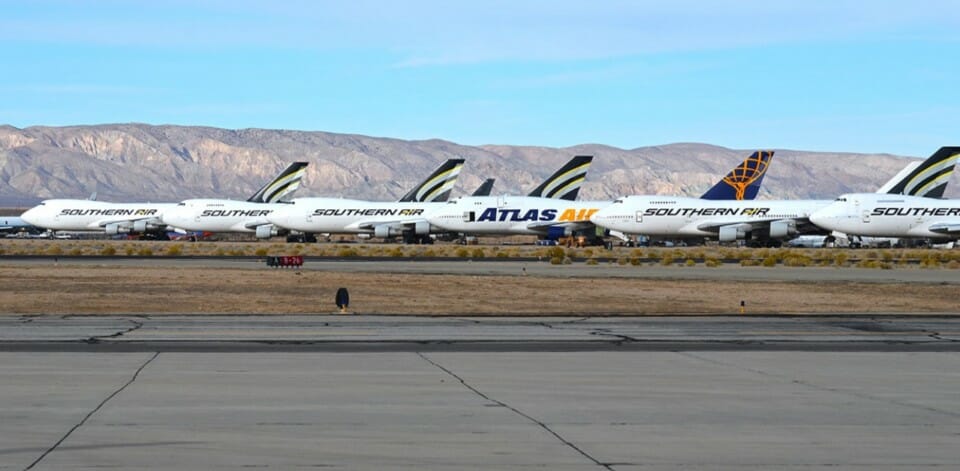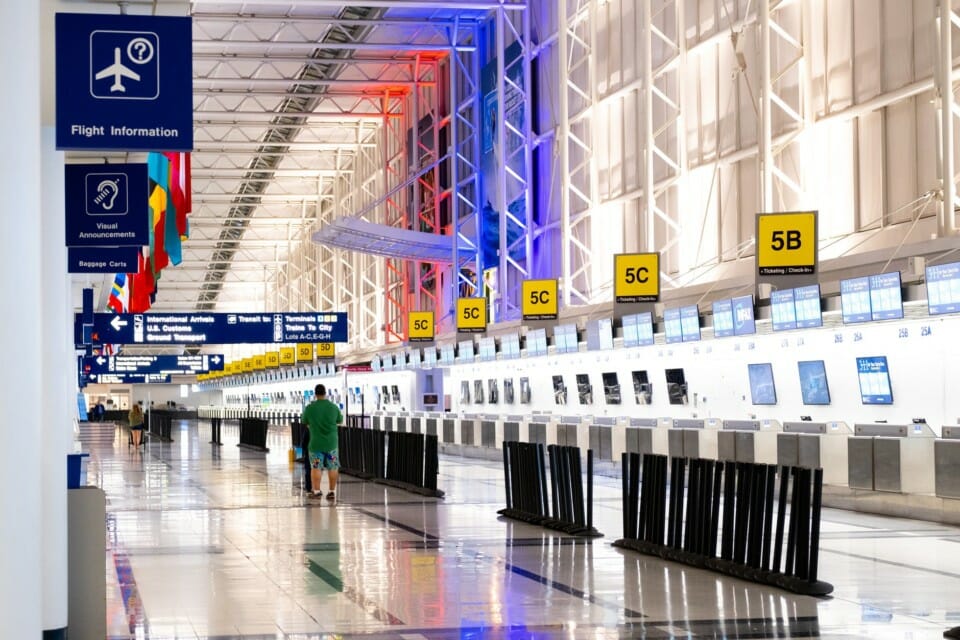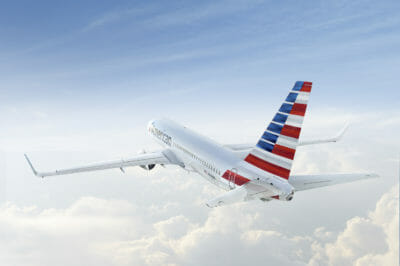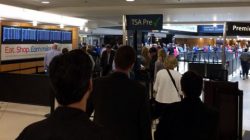The COVID-19 virus is making a lot of people sick. It is also giving airlines a severe headache in their balance sheets. To be clear, this event will eclipse the airline grounding after September 11th.
Passenger Traffic Falls Off A Cliff
With global travel bans in force and an unprecedented downturn for commercial air transportation is creating significant harm to air carriers around the world. Airlines are swamped with calls from concerned passengers wanting to change or cancel airline reservations.
The passenger falloff started in Asia and spread to Europe. UK regional carrier Flybe ceased operations last week. Many European airlines already face weak winter traffic counting on the summer season to make their year. Now, the summer travel season is in serious jeopardy.
Alaska Airlines has a new header on its website that recommends customers refrain from calling and use serve-serve options from its website:
Unprecedented call volumes: To ensure our contact centers can assist guests with immediate travel needs, please refrain from contacting us unless you have travel in the next 72 hours. View the details of our flexible travel policy for travel through April 30, 2020, and change your trip online.
The new coronavirus tactic of “social distancing” makes flying in airplane impractical if not impossible.
Substantial To Complete Cutbacks In Service
The major air carriers in the United States have announced service cutbacks of up to 40% with the heaviest cuts on international routes. Lufthansa is not only cutting back on its own routes but they are considering total shutdowns of other national airlines they control like Austrian Airlines. The plan for Austrian is to suspend flying all routes beginning March 19, 2020.
American Airlines has cut international service by 75% from March 16th through May 6th. United is cutting capacity in half for April and May. Delta is reducing capacity by 40% for the next few months with just one daily flight per day on five European routes.
Ryanair could ground most of its fleet over the next seven to ten days. They will be reducing seat capacity by 80% for April and May. If they end up with a complete grounding, that would park 470 aircraft.
Parking Aircraft
It is cheaper to park an aircraft that it is to fly one on a money-losing flight. There is a cost to just parking an aircraft. Aircraft sent for parking must be flown to a parking facility by Company pilots. There will be a cost for parking as well. When an aircraft is recalled to service, the airline must fly a crew to bring the aircraft back. On top of that, it can take a few days to get all of the scheduled aircraft back to the airports they belong to.

Capacity is no longer king. The first aircraft getting parked are the wide-bodies starting with the Airbus A-380 and Boeing 747. Since the majority of air service cuts are on international service, the remaining wide-bodies like the Boeing 777 and Airbus A-330 are the next to get parked.
Airlines that are considering obsoleting older aircraft like the Boeing 747-400 and Airbus A-340 along with the Airbus A-380 are being removed from fleet inventories sooner than later.
The Effect On Airline Employees
The biggest toll in the airline travel slowdown are the airline employees. Airlines employ hundreds of thousands of workers from ground and flight crews to ramp crews and mechanics. There are tens of thousands of contract workers that are employed by the airline. Flight attendants for example only get paid while they are working actual flights they are assigned to fly. It is estimated that airlines employ over 700,000 people.
There are thousands of workers that support airport operations from janitorial to terminal maintenance. Then there are taxi, Uber and Lyft drivers shuttling passengers to and from airports.
The Trump administration has promised over the weekend to cover paychecks for employees laid off due to Covid-19. There were no details on how and when this is to be accomplished.
What Airlines Should Be Doing
The most important thing that airlines can do in these uncertain times is to conserve cash. A healthy balance sheet could deteriorate quickly if costs are not reduced in the same proportions as revenues are reduced. Here are ways that airlines can adjust spending during this unprecedented situation:
- Initiate a hiring freeze,
- Reduce headcount to reflect the reduced flight schedules,
- Soliciting voluntary employee unpaid leave,
- Freeze or reduce wages for the remaining employees,
- Defer route expansion,
- Defer aircraft interior modifications and
- Defer new aircraft delivery.
Are Bankruptcies Looming?
Some air carriers like those in the U. S. have fairly good looking balance sheets. Other airlines around the world like El Al, Cathay Pacific, and Norweigen were already teetering because of their frail financial situations. There will be carriers that won’t be able to stay solvent especially since the Covid-19 situation could last the entire summer tourist season.
U. S. air carriers like Southwest and Alaska Airlines have route systems that mainly consist of domestic routes exempt from current travel bans. Both of these airliners have double-digit orders of Boeing 737MAX aircraft that have yet to be delivered. This may be a blessing in disguise because these airlines won’t have to make any aircraft payments until the aircraft are delivered. If push comes to shove, airlines could delay aircraft delivery to conserve on cash.
In the end, there may be fewer airlines around the world when this situation finally gets under control.
Possible Government Bailouts
The President and the airlines are already talking about bailouts in the neighborhood of $50 billion.
Yesterday, President Trump said that he was inclined to bail out the airline industry. His quote was “to back the airlines 100%. He gave no specifics so nobody knows what that would look like.
What the airlines want: The airlines are talking about a mix of:
- Direct aid,
- Loan guarantees and
- Tax breaks.
Direct aid and loan guarantees are self-explanatory. Taxes that airlines collect are for:
Passenger Facility Charges: Passenger Facility Charges (PFCs) of up to $18 USD may apply depending upon the itinerary chosen. Prices can be as low as $4.50.
Federal Excise Tax: A federal excise tax of 7.5% is charged on airfare.
Segment Fee: A segment fee of up to $4.00 USD does apply per flight segment. A flight segment is defined as one takeoff and one landing.
September 11th Security Fee: A September 11th Security Fee of $5.60 USD applies per one-way flight. An additional $5.60 fee(s) can be assessed if the trip itinerary includes a layover or stopover of longer than four hours domestically, or 12 hours internationally or to/from Alaska and Hawaii.
U.S. or International Departure and Arrival Charges: U.S. or international government-imposed taxes and a fee of up to $200.00 USD may apply depending upon the itinerary chosen.
Airport Landing Fees charged to airlines for operating at airports.
Airlines may ask to waive or suspend payments of taxes paid to the U. S. government.
Should American Airlines Receive Assistance?
American Airlines, in my opinion, should not receive any government assistance. The reason that I say this is that American Airlines is still full speed ahead with its project Oasis. If you are not familiar with project Oasis, it is the American Airlines 737 cabin refurbishment program to:
- Increase the number of seats,
- Reduce seat size in both economy and first class and
- Shrinking the size of the lavatories.
As I mentioned in what airlines should be doing, refurbishing passenger cabins while losing substantial amounts of money isn’t one of them. If they can’t be responsible for conserving their cash, they shouldn’t even think about receiving government aid.
Final Thoughts
This period of economic uncertainty is truly unprecedented. It is far worse than what happened with September 11th when aircraft were grounded for a matter of days. Nobody knows when the Covid-19 virus situation will get under control.
Air travel bans and air travelers not wanting to fly are wreaking financial havoc on both international and domestic airlines. Tens of thousands of airport and airline workers could find themselves unemployed or facing pay cuts.
The greatest uncertainty is just how long the Covid-19 crisis will last. The air travel landscape may have a different look with some airlines facing financial failure.
Finally, Sir Richard Branson of Virgin Airways was asked this question at an audience Q and A:
Question – Richard, what is the fastest way to become a millionaire?
Answer – Start as a billionaire and open an airline.




